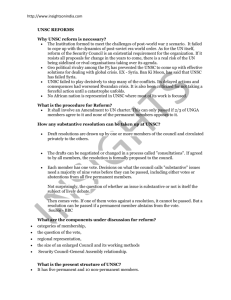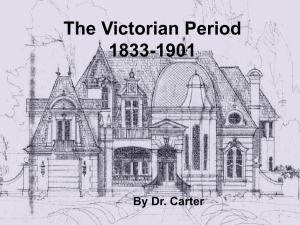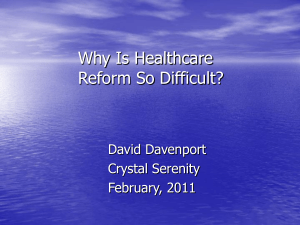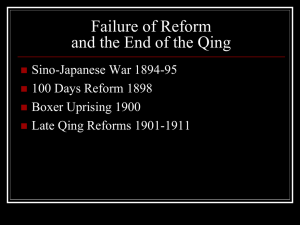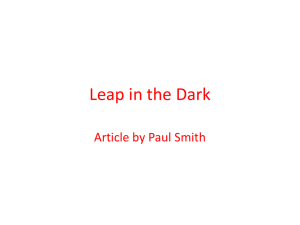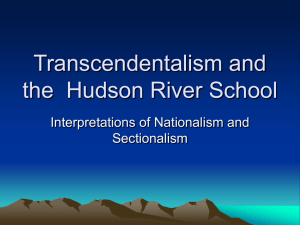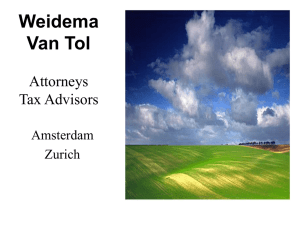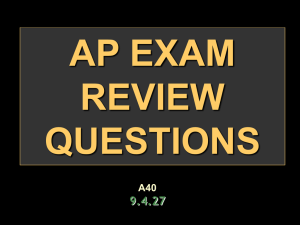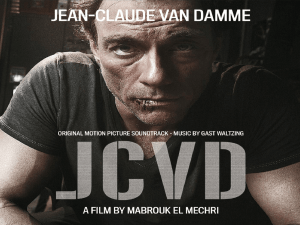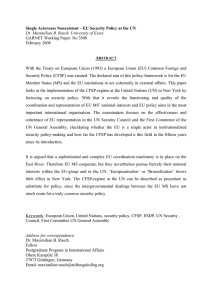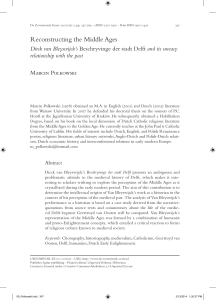Setting a progressive United Nations peace and
advertisement
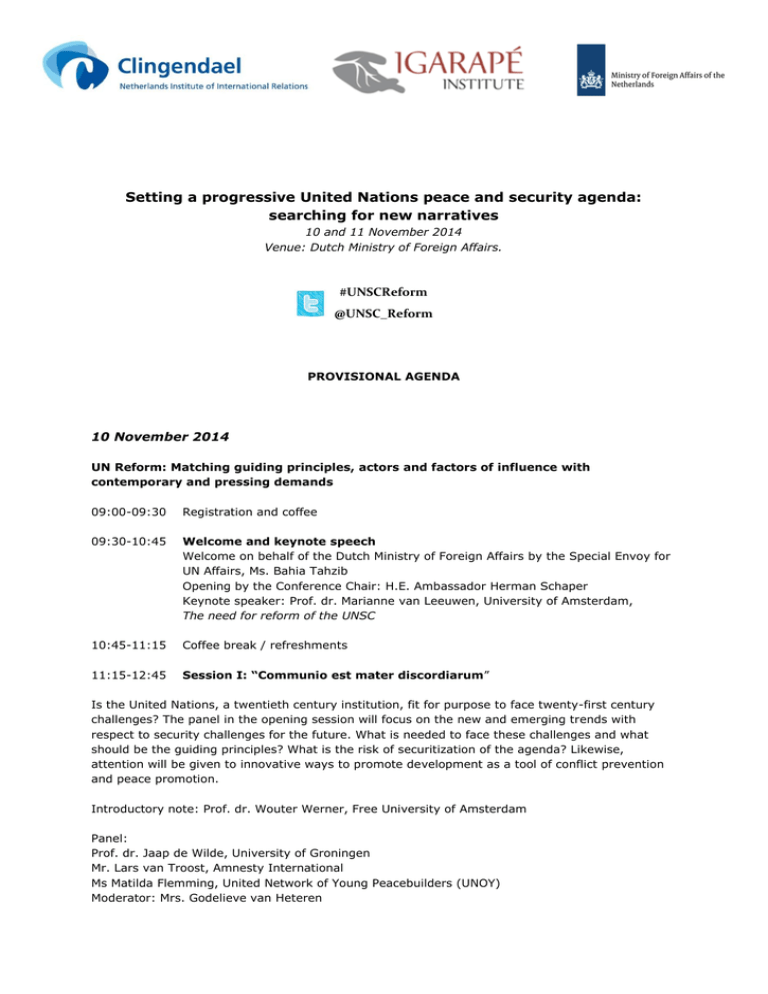
Setting a progressive United Nations peace and security agenda: searching for new narratives 10 and 11 November 2014 Venue: Dutch Ministry of Foreign Affairs. #UNSCReform @UNSC_Reform PROVISIONAL AGENDA 10 November 2014 UN Reform: Matching guiding principles, actors and factors of influence with contemporary and pressing demands 09:00-09:30 Registration and coffee 09:30-10:45 Welcome and keynote speech Welcome on behalf of the Dutch Ministry of Foreign Affairs by the Special Envoy for UN Affairs, Ms. Bahia Tahzib Opening by the Conference Chair: H.E. Ambassador Herman Schaper Keynote speaker: Prof. dr. Marianne van Leeuwen, University of Amsterdam, The need for reform of the UNSC 10:45-11:15 Coffee break / refreshments 11:15-12:45 Session I: “Communio est mater discordiarum” Is the United Nations, a twentieth century institution, fit for purpose to face twenty-first century challenges? The panel in the opening session will focus on the new and emerging trends with respect to security challenges for the future. What is needed to face these challenges and what should be the guiding principles? What is the risk of securitization of the agenda? Likewise, attention will be given to innovative ways to promote development as a tool of conflict prevention and peace promotion. Introductory note: Prof. dr. Wouter Werner, Free University of Amsterdam Panel: Prof. dr. Jaap de Wilde, University of Groningen Mr. Lars van Troost, Amnesty International Ms Matilda Flemming, United Network of Young Peacebuilders (UNOY) Moderator: Mrs. Godelieve van Heteren 12:45-14:00 Lunch Lunch will be served in the Lounge. At 13.00 hrs, the National Memorial Service on the Downing of Flight MH17 will be broadcasted in the Max van der Stoel meeting room for participants who would like to follow the service. 14:00-15:30 Session II – A Changing World with emerging powers, new stakeholders and other factors of influence Globalisation, multipolarity, grass-root initiated mechanisms of change, and technological developments especially with regard to communications are all factors of influence with regard to the way the international community can organize itself with regard to preserving peace and security. New actors, such as emerging powers, multinational cooperations, and civil society, with different priorities will try to influence the agenda for sustainable security and development, including in the context of the post-2015 agenda. They will consider whether existing tools and procedures are adequate, and what kinds of upgrades are needed. What will or need to be their position with regard to the reform of the UNSC? Introductory note: Prof.dr. Jaap de Wilde, University of Groningen Panel: Mr. Fulco van Deventer, Human Security Collective Dr. Caroline van Leenders, Netherlands Enterprise Agency Moderator: Prof. dr. Yvonne Donders, University of Amsterdam 15:30-15:45 Coffee break / refreshments 15:45-17:15 Session III – “The world is over-armed and peace is underfunded” (UN Secretary-General Ban Ki Moon) What are the main trends for the next 5 or 10 years in terms of financing peace and security? How does this relate to the trends of funding development assistance? Can Brazil and the Netherlands play any decisive role in changing the current situation? Introductory note: Prof. dr. Joris Voorhoeve, former Minister of Defence, chairman Oxfam International Panel: Gen. (ret) Kees Homan, Clingendael Institute Mr. Jan Jaap van Oosterzee, Pax for Peace Prof. dr. Georg Frerks, Dutch Defence Academy Moderator: Dr. Eduarda Hamann, Igarapé 17:15-17:30 Wrap up by the Conference Chair 11 November 2014 The UN Security Council reform: Imagine the future 09:00-09:30 Registration and coffee 09:30-11:00 Session IV Unpacking positions and interests on UNSC reform What are the key most challenging issues for the UNSC reform? What are the underlying interests, not only the positions, of the main actors or group of actors when dealing with the core themes of the UNSC reform, such as membership and working methods? Introductory note: Mrs. Lydia Swart, Center for UN Reform Education, NYU Panel discussion: Dr. Edith Drieskens, Catholic University of Leuven Dr. Eduarda Hamann, Igarapé Mr. Frank Majoor, Former Ambassador of the Netherlands to the Permanent Mission to the UN (NY) Moderator: Dr. Bibi van Ginkel, Clingendael 11:00-11:30 Coffee break / refreshments 11:30-13:00 Session V: – High-level addresses from the Netherlands and Brazil; Proposals for reform from the next generation: thinking out of the box Opening by the Conference Chair: H.E. Ambassador Herman Schaper Presenting the winning essays of the student essay contest, by the President of the Jury Address by the Director General of Political Affairs of the Dutch Ministry of Foreign Affairs, mr. Wim Geerts Address by the Under-Secretary of External Relations of Brazil, H.E. Mr. Carlos Antonio da Rocha Paranhos, Undersecretary for Political Affairs Questions by the Students to the speakers 13:00-14:30 Lunch 14:30-16:30 Session VI: Creating a user-friendly roadmap for UNSC reform “Ubi homo, ibi jus. Ubi societas, ibi jus”. Locating new narratives for UNSC reform that emphasize peace and security “A digito cognoscitur leo” / “In dubio pro libertate” Within years of the creation of the UN and its Security Council, there has been an active debate on its reform. This is hardly surprising – a changing world often requires changes in the human-made institutions designed to manage peace, security and development. And yet notwithstanding some minor shifts, the UNSC has been surprisingly resistant to meaningful reform. The last ten years have witnessed a surprisingly resilient stalemate, one that risks undermining the legitimacy and authority of the UN itself. The final session will consider ways of breaking the deadlock. What are the practical ways to move a UNSC reform agenda forward in and outside of the United Nations? The goal of the session is to identify ways of moving innovative proposals emerging from the lofty heights of seminar discussion to the hallways of the United Nations and capitals around the world. The session will consider how best to package key proposals for public consumption in both conventional and new social media. It will also reflect on ways of using public and private diplomatic means inside and outside of the United Nations. It will challenge Brazil and the Netherlands to identify new narratives for reform, ones that are consistent with existing foreign policy priorities but also aligned with core principles of the UN Charter. The goal will be to identify some practical strategies moving forward. Panel moderator: H.E. Ambassador Herman Schaper Rapporteur of Student Shadow Seminar on UN Reform Rapporteur on main points during two Symposium days, Ms. Lianne Boer, Free University of Amsterdam Panel: Prof. Willem van Genugten, University of Tilburg Mr. Paul Brill, Volkskrant, Mr. Ahmad Fawzi, Former UN Joint Special Envoy to Syria for mr. Kofi Annan Mr. Ton Huijzer, Refugee Foundation (Stichting Vluchteling) Jilt van Schayk, Youth Representative to the United Nations Prof. Kees Koonings, CEDLA, University of Amsterdam and University of Utrecht 16:30-16:45 Closing remarks by H.E. Ambassador Herman Schaper and Dr. Bibi van Ginkel (Clingendael) 16.45 Reception
